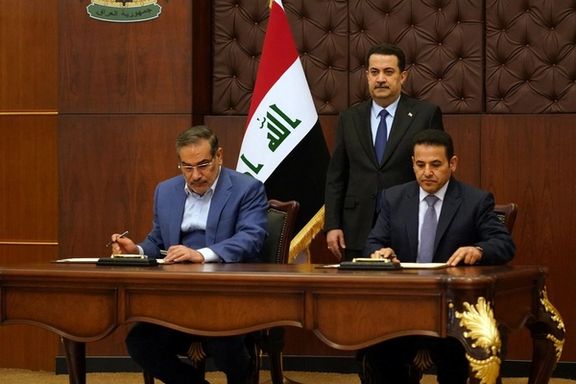Iran Claims Successes In Regional Diplomacy Following Saudi Deal

It has been a busy few days for Iran’s national security chief as he flies round the region trying to mend ties with Arab neighbors.

It has been a busy few days for Iran’s national security chief as he flies round the region trying to mend ties with Arab neighbors.
Instead of the country’s foreign minister, Hossein-Amir Abdollahian, it is Ali Shamkhani who has become the diplomatic face of the regime on visits spanning some of the key regional countries.
Since Shamkhani signed an agreement with Saudi Arabia in Beijing on March 10 to restore ties with Riyadh, he has embarked on regional trips to improve strained relations with Arab neighbors. A visit to the UAE and then Iraq were part of the effort to continue the momentum.
Bolstering economic ties is of course the underlying goal but it is an important message that it should be an official trusted by Iran's ruler Ali Khamenei who is the messenger on this important diplomatic tour de force.
During his Sunday meetings in Iraq, agreements were reached for the repayment of Iraqi debts by imports of goods, Shamkhani claimed. He tried to be the bearer of good news for the Iranian people as the country struggles to even get hold of basic food items amidst this great sanction-burdened economic crisis.
Shamkhani told the official government news agency IRNA Monday that his one-day trip was “productive”, hot on the heels of his visit to the United Arab Emirates a few days earlier.
Iraq owes well-over $10 billion to Iran – by some estimates almost $20 billion – for imports and natural gas and electricity. However, due to US banking sanctions on Iran, Iraq cannot pay cash dollars to Tehran.
A mechanism exists for sending essential goods, such as food and medicine in exchange for the Iraqi debt. Shamkhani said that he and the delegation accompanying him held talks with Iraqi officials to facilitate this mechanism, but he was careful in his wording not to hint at any cash transfers.
Shamkhani told IRNA: “Another step was to determine mechanisms for using resources related to Iran’s financial receivables from Iraq to purchase essential goods and to resolve currency issues related to [bilateral] trade.”
Iranian officials said that Shamkhani has also agreed on a deal with the UAE on using dirhams for bilateral transactions, although the UAE has not confirmed any such agreements. It too, must watch its step as it remains on the Financial Act Task Force gray list, which it will not want to worsen by anything less than above board in its business ties to Iran.
Over the weekend, officials in Tehran even claimed that after the deal they injected hundreds of millions of UAE dirhams into the local forex market to support the battered Iranian rial. Contrary to the claim, the rial fell on Sunday and was trading at 490,000 to the US dollar on Monday, down from 460,000 on Friday.
Iraq may yet be more of a diplomatic ally than a financial one. Since the US invasion in 2003, Iraq’s foreign currency reserves have been held by the US Federal Reserve, giving Washington significant control over Iraq’s dollar transfers.
The Central Bank of Iraq requests dollars from the Fed and then sells them to commercial banks and exchange houses at the official exchange rate through a mechanism known as the “dollar auction.”
Reports earlier this year indicated that the United States restricted dollar transfers to Iraq because of suspicions of Iranian money laundering and dollar transfers to Tehran.
These restrictions even led to a dollar scarcity on the local market in Iraq and the fall of the Iraqi dinar. Subsequently, Baghdad sent a high-level delegation to Washington in February to resolve the issue and they discussed banking and money laundering issues related to Iran.
In its desperation amid a serious financial crunch due to continuing US sanctions, the Islamic Republic hopes that better ties with Persian Gulf Arab countries can help reduce the pressure. But these countries are well aware of US sanctions and it is not clear how far they would go in accommodating the Iranian regime’s needs for an economic lifeline.
The financial pressure is also needed to convince Tehran to abide by promises it apparently made to Saudi Arabia. Chief among them is ending its military support for Yemen’s Houthis who have been fighting a Saudi coalition for eight years. This, remains to be seen.